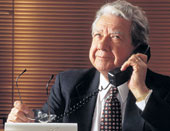 |
Bob Edgar stands as a beacon of longevity at a time when few executives remain in the same place for long. Edgar is still at the same insurance company, in the same line of work, for the 58th year in a row.
There was a time when Edgar’s story was not nearly as unusual. The starting gate and finish line were often on the same career track, and there was that symbolic gold watch at the end of a race well run. “People used to be proud to stay in one place,” Edgar says. “You don’t see that anymore.”
Edgar was 18 when he started at the New York office of Chubb & Son in 1947. He began as a clerk, writing changes to insurance policies. He signed on because he needed a job, and stayed because he liked the people. “Mr Taylor, who hired me, was a wonderful man. Mr Wren, he was a taskmaster, but you really respected him,” he remembers. He never would have thought of calling Mr Wren “Fred” or Mr Taylor “Addison”. “You showed respect,” he says.
Most colleagues now call him Bob, which he likes, because “that’s the way it’s done.” A few call him Mr Edgar, which he doesn’t mind, because he sees it as a tip of their hats to his years on the job. He gave a lot to Chubb during those years ? moving up the ranks and around the country, never marrying, spending up to half his time on the road. But he tries not to talk about the old days too often.
“Longevity doesn’t get you anything. It’s what you do with the longevity that counts,” he says. “You can’t come into work every day and say ‘this is the way we used to do it’. “You just can’t dwell on the past.”
Should younger workers ask, Edgar would tell them that work is decidedly more efficient these days. Years ago, he says, Friday afternoons were set aside for the task of signing completed policies. If an error or erasure was found in a document, it was deemed unacceptable and sent to a secretary to be retyped. “When I think about it now, I really feel sorry for those women,” he says.
What he would probably not tell a younger colleague, because he doesn’t want to be thought of as a complainer, is that work was also more fun back then. Business was done in person, not by e-mail or telephone. There was more laughter, too, he says. When coffee spilled on a stack of papers, Edgar remembers drying them on a line he strung up across the office, using paper clips and string.
For all that has changed over the years, some things remain the same, including the sobering context of the business he is in. “In all of my years, there have been many tragedies,” he says, as his office and his industry scrambled to begin totalling the damage on the Gulf Coast. “But the ones that seem to do the worst damage in the United States are the hurricanes,” he adds.
After he turned 65, Edgar officially retired as assistant national commercial property manager. But he never actually left. He came back the next day as a consultant. “If I didn’t have this, I’d go buggy,” he says of his job, which includes writing and revising Chubb’s employee manuals and internal policies. “I could have retired and sat in a rocking chair, but I’d probably be in a pine box now, either that or in the bug house.”
It is a point of pride, he says, that he is not just doing busy work. He does not just want someplace to go, he wants something important to do. “They’re not making work for me,” he says. “They are getting something in return. If they weren’t, I wouldn’t be here. I have to prove myself every day.” Except, it seems, in the technological sense. “I still don’t know how to type,” he says. “In those days, I wasn’t being paid to type. I could dictate very fast. I could even punctuate as I dictate. I still can.”
So he writes his manuals as he always has ? in longhand, cutting and pasting as he goes. “Not cutting and pasting on a computer,” he says. “Cutting and pasting. With scissors. And Scotch tape.”
?NYTNS










